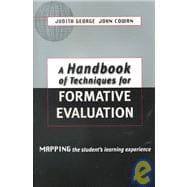
Note: Supplemental materials are not guaranteed with Rental or Used book purchases.
Purchase Benefits
Looking to rent a book? Rent A Handbook of Techniques for Formative Evaluation: Mapping the Students' Learning Experience [ISBN: 9780749430634] for the semester, quarter, and short term or search our site for other textbooks by George & Cowan. Renting a textbook can save you up to 90% from the cost of buying.
| Introduction | p. 1 |
| Approaching Curriculum Development Systematically | p. 6 |
| Where does formative evaluation fit in? | p. 6 |
| Why is it an iterative process? | p. 8 |
| What approaches to evaluation are there? | p. 10 |
| What kind of information do you need from formative evaluation? | p. 11 |
| What, then, should your formative evaluation cover? | p. 13 |
| How will you deal with the outcomes, and plan action? | p. 14 |
| Don't neglect the students! | p. 15 |
| The relationship between formative and summative evaluations | p. 16 |
| Educational enquiries - a case study describing modes of enquiry | p. 18 |
| Choosing A Method of Formative Evaluation - and Using It | p. 24 |
| What do you want to know? | p. 24 |
| The purpose should determine the method | p. 25 |
| The potential to bring about change is an important consideration | p. 27 |
| Multiple perspectives can enhance evaluation, and its usefulness | p. 27 |
| Beware your own assumptions | p. 29 |
| Consider resourcing carefully - especially in terms of human resource | p. 29 |
| Is the evaluation likely to convince those who receive it? | p. 30 |
| The process | p. 31 |
| Our grouping of methods | p. 34 |
| Obtaining Information about the Immediate Learning Experience | p. 37 |
| Our descriptions | p. 37 |
| Possible gender differences | p. 37 |
| Self-confidence surveys | p. 38 |
| Dynamic lists of questions - studying learning during an event | p. 39 |
| Observations - a method which depends on the assistance of a colleague | p. 40 |
| Critical incident technique | p. 43 |
| Talk-aloud protocols | p. 44 |
| Journals, diaries and logs - which we regard as different | p. 47 |
| Self-review | p. 53 |
| Collecting comments from groups | p. 54 |
| Obtaining Information about Immediate Reactions During the Learning Experience | p. 57 |
| Identifying students' constructs in relation to their learning | p. 57 |
| Interpersonal process recall | p. 60 |
| Journals - again! | p. 63 |
| Obtaining Information about Learning Outcomes | p. 65 |
| Concept mapping | p. 65 |
| Pre-testing and post-testing | p. 68 |
| Analysis of exam answers | p. 69 |
| RSQC2 | p. 70 |
| Obtaining Information about Student Reactions After the Experience | p. 72 |
| Questionnaires | p. 72 |
| Interviews | p. 80 |
| Delphi techniques | p. 83 |
| A letter to next year's students | p. 84 |
| A closing 'wash-up' session - perhaps with a preparatory session | p. 86 |
| 'Not quite' rounds | p. 87 |
| Collecting Post-its | p. 88 |
| Focus groups | p. 89 |
| Stop/start/continue | p. 90 |
| Identifying Topics that Merit Further Evaluative Enquiry | p. 93 |
| Nominal group technique | p. 93 |
| Q-methodology | p. 94 |
| Other methods that can point to further enquiry | p. 95 |
| Formative Evaluation of Assessment | p. 98 |
| Why include assessment here, anyway? | p. 98 |
| The need for improvement - and hence for evaluation | p. 99 |
| How can these factors be evaluated? | p. 100 |
| Action Research and Its Impact on Student Learning | p. 110 |
| Reminder sheets for colleagues who assist you | p. 115 |
| References | p. 124 |
| Further reading | p. 129 |
| Index | p. 131 |
| Table of Contents provided by Syndetics. All Rights Reserved. |
The New copy of this book will include any supplemental materials advertised. Please check the title of the book to determine if it should include any access cards, study guides, lab manuals, CDs, etc.
The Used, Rental and eBook copies of this book are not guaranteed to include any supplemental materials. Typically, only the book itself is included. This is true even if the title states it includes any access cards, study guides, lab manuals, CDs, etc.